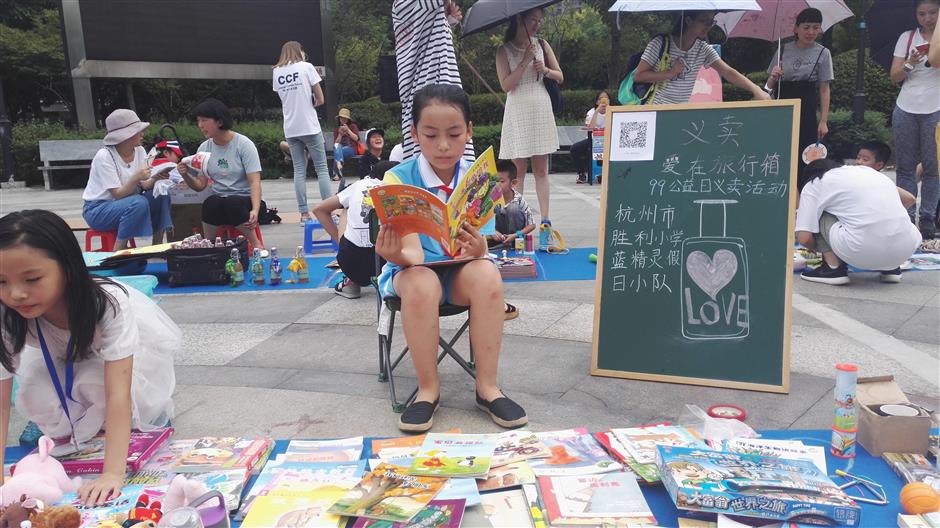Charity is not only about donating money
China has changed its Charity Law to loosen restrictions on public fundraising as donations over the Internet grow. But controversies have also followed over use of the money and verification of the beneficiaries.
September 9 was “Charity Day” for Tencent, one of the largest Internet companies in China. Wang Jiao, director of Children Change Future (CCF), organized a charity fair for the day through Tencent's online donation platform. CCF is an education program set up in May in Hangzhou to cultivate awareness of social responsibility for children aged from 9 to 18.
The fair took place in three places.
Some items for charity sales were used and unused books, toys and self-made ornaments. Others were brought by parents from shops. Used children’s books sold for 2 yuan (30 US cents), while a new toy was 40 yuan.
Almost 140 students signed up for the event and one parent said the slots were “snatched within seconds.”
“The local community and TAL, a cram school chain in Hangzhou, forwarded our information to students in primary schools,” Wang told Shanghai Daily. “Most of them were 3rd graders to 6th graders.”
No cash was allowed. All donations were made on Tecent’s online donation platform on WeChat.
You can still donate online by clicking on the “Get Involved” button when someone shares a link. The money collected will be given to Free Lunch for Children, a charitable foundation under the China Social Welfare Foundation which helps improve diets for rural children.
“It is important for participants to understand what donations are used for,” said Wang. “And we told parents and students in our pre-sale training, that they are not allowed to take money from donors directly.”
After four hours, donations reached more than 23,000 yuan. The biggest contributor was a team named “Class 1, Grade 4 of Pujia Primary School.”
Each team reported the amount they raised to CCF. And the number was checked by staffers with the one recorded online and will be written on a certificate awarded to students.
For parents, it is far more than just a competition. A mother surnamed Jin told Shanghai Daily the sale helped her daughter realize that nothing is easy.
“I take her for volunteering often,” said Jin, “It is usually hard work. I am very careful about donations. But this time it’s Tencent, a big company, so we trust it.”

A student from Shengli Primary School read a book while waiting for the customers at the charity sale in Hangzhou.
Last year, the national Ministry of Public Affairs approved for the first time 13 online donation platforms. Tencent’s “Happy Donation” platform is one.
They are not allowed to receive any public donations but act only as a platform for legitimate operators, usually charitable foundations. On its website, Tencent promises a bank transfer to the designated foundation within five days.
Legally, they are also responsible for verifying each program that submits information online. The website also reports on the progress of the programs.
Not all programs go as smoothly as CCF. On August 29, an online charity auction on Tencent incurred huge criticism on social media.
It was a warm-up promotional event for the “Charity Day,” launched by Tencent and World of Art Brut Culture (WABC), a not-for-profit organization for the mentally retarded.
People can donate a minimum of 1 yuan for buying a picture painted by the disabled. The picture is in electronic form that people can save and share on social media.
The impressive art and heart-touching interpretations quickly spread on Internet. Within hours, more than 5 million people contributed online and the target of raising 15 million yuan was hit.
But questions quickly started being asked. People questioned the veracity of the organization as nothing on the page indicated how the money would be used. Some asked if the organizers took commissions.
“Charitable deeds are based on trust. People either have faith in a fully-fledged institution or a single person. But interpersonal trust can hardly be developed in online donations,” said Ma Meiying, research fellow at the Center for Public Affairs at Zhejiang University.
Ma said the power of government regulations is very limited. The authorities and charitable organizations should make more public participation and public scrutiny possible.
For CCF, it was only their first offline event in Hangzhou. They will offer more courses and volunteering opportunities for youngsters to learn what charity really means and how to do it properly.
“Big aid projects actually need a lot of assessment beforehand to see if the purpose can be met without unnecessary harm,” said Wang. “Charity is not always about giving out money. We also encourage students to solutions that target specific social problems.”
















